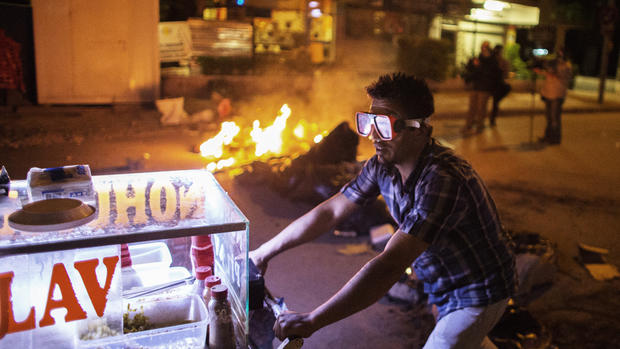Turkish government proposes referendum to end protests
ANKARA, Turkey The Turkish government is open to holding a referendum over an Istanbul development plan that has had a central role in nearly two weeks of mass protests, a spokesman for Prime Minister Recep Tayyip Erdogan's party said Wednesday.
The announcement following talks between Erdogan and a group of activists amounts to the first big gesture by his government to end a standoff with protesters in Istanbul's Taksim Square and around the country.
But on a more defiant note, Justice and Development Party spokesman Huseyin Celik also said the government would not allow the ongoing sit-in in Gezi Park, next to the square, to continue "until doomsday" — a sign that authorities' patience is running out.
The prospect of a referendum amounts to a political gamble by Erdogan, who has drawn the ire of protesters over his alleged authoritarian streak. He appeared to be betting that his strong base of support would vote for the plans.
- Turkish lawyers join the protest fray, angry at rough treatment
- Clashes in Istanbul extend into night in Taksim
- Woman in red dress" becomes symbol of Turkish protests
The protests erupted May 31 after a violent police crackdown on a peaceful sit-in by activists objecting to the project to replace Gezi Park with a replica Ottoman-era barracks. They then spread to 78 cities across the country and have attracted tens of thousands of people nearly every night.
Celik said the referendum would be on the Ottoman-era barracks. But he said it would exclude the planned demolition of a cultural center that the protesters also oppose; Celik said the center was in an earthquake-prone area, and needed to come down.
Erdogan hosted the 11 activists — including academics, students and artists — in his offices in Ankara. Some leaders of civil society groups, including Greenpeace, had said they would not participate because of an "environment of violence" in the country.
Meanwhile, police and protesters retrenched after fierce overnight clashes in Taksim Square. In Ankara and Istanbul, thousands of lawyers railed against the alleged rough treatment of dozens of their colleagues, who police briefly detained in Istanbul on the sidelines of Tuesday's unrest.
Sema Aksoy, the deputy head of the Ankara lawyer's association, said the lawyers were handcuffed and pulled over the ground. She called the police action an affront to Turkey's judicial system.
"Lawyers can't be dragged on the ground!" the demonstrating lawyers shouted in rhythm as they marched out of an Istanbul courthouse. Riot police stood off to the side, shields at the ready.
Turkey's Human Rights Foundation said Istanbul prosecutors had launched an investigation into allegations of excessive use of police force during the protests.
The foundation said 620 people, including a 1-year-old baby, were injured during the police crackdown early Wednesday. Police detained around 70 people during the incidents. Prior to this, activists reported that 5,000 people had been injured or seriously affected by the tear gas and four people have died in the protests.
After Tuesday's violence, traffic returned to Taksim Square with taxis, trucks and pedestrians back on the streets. At one point, some police were seen kicking a soccer ball on the square. Riot police stood to the side, near a new barricade of wrecked cars and construction material that activists put up to impede their ability to fire tear gas on the park.
Hundreds of protesters remained camped out in Gezi Park, clearing up after a night of trying to fend off tear gas. An early morning storm blew down tents and soaked bedding. Donations of food and supplies including tents, sleeping bags and toilet paper continued to arrive.
On Tuesday, riot police firing water cannons and tear gas clashed all day and night with pockets of protesters throwing stones and setting off fireworks. The pitched battles didn't simmer down until just before dawn.
The protests are drawing expressions of concern from abroad.
Germany's government was "following the news from Turkey with great preoccupation, especially the images of yesterday's police action," Chancellor Angela Merkel's spokesman Steffen Seibert said Wednesday. "Now de-escalation is needed. Only an open dialogue can contribute to easing the situation."
